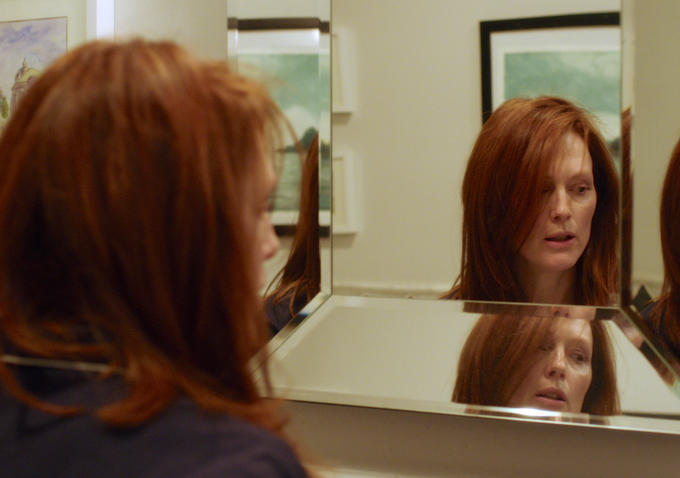If you are as cynical as I can be, then a film that drops around awards season about a disease should draw nothing but skepticism. Yes, Still Alice is about an ailment and yes, it is mainly a vehicle for a performance. However, it is a really good performance in a film that handles delicate subject matter very tastefully.
Still Alice stitches together a narrative based on both forgetting and remembrance. Julianne Moore is our Alice. Alice is a widely respected professor at Columbia whose life takes a tragic turn when she is diagnosed with Alzheimer’s Disease. We follow Alice as her memory and well being slip further and further away from her.
This film is The Fault in Our Stars for Oscar bait: it can make you cry just from a quick glance at its logline. Still Alice doesn’t exploit cheap emotions, but rather it makes us feel everything that we might feel if we were in this situation. A lot of people have had a relative who has suffered from Alzheimer’s or dementia and can relate. However, few of us can claim to have actually felt it. Directors Richard Glatzer and Wash Westmoreland are great at conveying Alice’s worsening condition with some visual tricks, which translates to a lot of blurred vision. Regardless, they use the camera to help us see through Alice’s eyes. That is one of the many beauties of film: it can put us directly into somebody’s brain.
While the directing here hasn’t gotten enough credit, the core of the film’s emotional drive definitely lies in all of the performances. Moore (more on her soon) is accompanied by some worthy scene partners. As Alice’s husband, Alec Baldwin brings a sense of tough vulnerability and relaxed intensity to remind us that he is not just that crazy guy who yells at bikers and paparazzo. Meanwhile, Kristen Stewart brings a surprising amount of emotional range to the table as the youngest daughter who is still trying to figure life out.
Let’s get back to Julianne Moore. There has been a lot of talk about her performance and how she will probably win the Oscar for it. That’s a good call, as Moore brings life, depth, and sadness to this character in a way that few other actresses could. The reason we identify and sympathize with Alice’s continuing struggle is because we understand how much she is losing. We get the sense that no matter what happens, Alice is still somehow present. Moore’s work is really what makes the film worth watching.
Still Alice is a delicate and patient film about love and loss. While it is not perfect (it moves at a glacial pace early on), the sum of its parts makes the whole more than worth it.
Brain Farts From The Edge
- One of my favorite national past times is complaining about how modern films integrate technology (see: Chef). However, Still Alice does it well. It is in your face a lot, but it is not a major plot point. Hey, that is how people communicate now. So, I am going to have to get used to Skype calls and iPhone notes in movies.
- This film takes place primarily on the Upper West Side of Manhattan. That’s You’ve Got Mail territory, for all of you You’ve Got Mail-ites out there.
- There is a scene where Alice takes out a challah. One scene later, they all wish each other Merry Christmas. What.

